Peking University, August 21, 2020: Qiao Jie, one of the heroines in the serious fight against COVID-19, has endured countless days and nights spent at the very front line of the battlefield in Wuhan, China. Qiao is also executive vice president of Peking University Health Science Center, president of Peking University Third Hospital (PUTH), director of the National Clinical Research Center on Obstetrics and Gynecology (OBYGN) Disease and director of National Center for Healthcare Quality Management in Obstetrics. She wears her protective suit with pride and dignity, for she was given the mission to lead the team of medical staff from PUTH in Wuhan to protect and save the lives of people affected by the novel coronavirus pandemic. What sets her apart from the other doctors on the front line of the battle is that her area of expertise lies within the fields of obstetrics and gynecology. As the director of the National Centre for Healthcare Quality Management in Obstetrics, she has been dedicated to the research on the impact of the coronavirus on pregnancy, using her expertise to protect the wellbeing and safety of pregnant women who have contracted COVID-19.
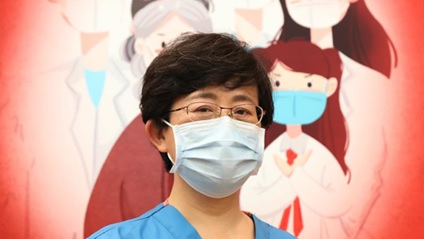
Qiao Jie
On February 1, Qiao received a sudden instruction to rush to Wuhan as soon as possible. She was appointed to lead the second batch of medical staff from PUTH to Wuhan to carry out medical rescue work. Previously, Peking University had already dispatched its first batch of 20 medical staff to the Sino-French City Branch of Tongji Hospital in Wuhan. However, more medical professionals were needed in the efforts to control the coronavirus. Qiao and her team hurriedly packed their items and bid farewell to their families and embarked to Wuhan to join the first batch of medical staff. Her team included Shen Ning, vice president and deputy director of Respiratory and Critical Care Medicine, Li Shu, attending doctor of the Department of Emergency Medicine, and Li Xiang, party officer of the hospital. Six days later, Peking University dispatched another emergency medical team, comprising 113 doctors, nurses and medical administrators.
On February 7, the total number of medical staff from PUTH contributing to epidemic prevention and control in Wuhan reached 137.
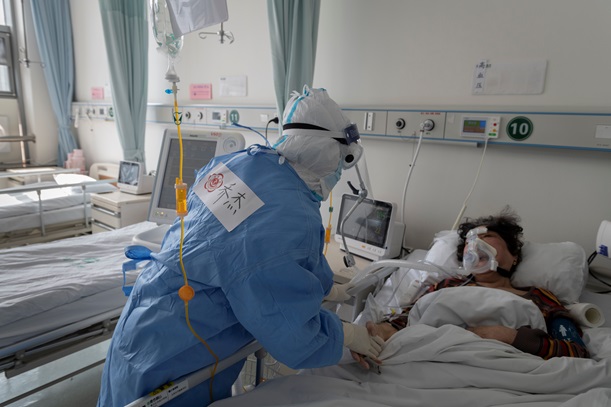
Qiao visits a patient
Upon arrival at the Sino-French New City Branch of Tongji Hospital, Qiao and the 137 members from PUTH shouldered the responsibility of taking care of the critically-ill patients housed in the new medical wards. Qiao made sure that great efforts were put into ensuring the safety and wellbeing of the medical staff under her leadership, often telling them, “In the front line of Wuhan, even the smallest matters concerning the medical team is a big matter.” Qiao trimmed their hair in person and implemented strict guidelines for each of their protective equipment, earning her a lot of praises along with the title of “Mother Qiao.” In response to the praises, Qiao humbly says that those are just words of encouragement. She would trim her son’s hair in the past, but it is not something she does on a daily basis. However, in times of need, safety is a priority and little gesture like this can make a big difference.

Qiao trims the hair of medical staff
“Mother Qiao”
Li Na, a medical member from PUTH who also participated in the efforts to fight the pandemic in Wuhan, recounted the selfless help and support given by Qiao during the time when she was suddenly struck by a recurring stomach pain, leaving her with no choice but to take a leave of absence. In the interview, Li mentioned that upon hearing that she was unwell, Qiao immediately called in medical experts to her bedside. Li was initially diagnosed with acute appendicitis. After operation, medical experts confirmed it was diverticulitis. While Li was recuperating, Qiao and the other medical experts discussed her condition and made various emergency plans. As soon as Li’s body temperature elevated, Qiao contacted the general surgery expert of the hospital. Without further ado, Academician Chen Xiaoping proceeded with surgery. During the whole recuperation period, Qiao gave Li a lot of assurance and came to see her in person. Qiao constantly gave words of affirmation, “Nana, don't worry. The hospital has arranged the best doctors and nursing teams to be responsible for the surgery and nursing, and we will accompany you.” Thanks to Qiao, and the rest of the medical team, Li went through a smooth recovery despite having a few other medical complications that would have made the surgery and recovery more challenging.
Apart from treating the critically-ill and taking care of the wellbeing of the medical staff, Qiao took charge of many other responsibilities. During the time in Wuhan, Qiao had to maintain close communication with medical professionals from various hospitals to sort out problems concerning the hospital workflow, the establishment of the management system, the renovation of wards, the training of medical personnel and the deployment of medical equipment. Qiao made sure that every minuscule detail was taken care of, leading the team to give full play to the advantages of Peking University's multidisciplinary cooperation. With that, they successfully increased the cure rate and reduced the mortality rate of critically-ill patients.

Qiao labels protective suits of her team
“Patients give me hope”
The Sino-French New City Branch of Tongji Hospital received a lot of critically-ill patients on a daily basis. But along with the increase in knowledge and expertise in dealing with the virus, patients became more and more cooperative.
When asked by China Central Television (CCTV) what her most memorable experience was during the fight against the pandemic, Qiao mentioned that it was her patients that left her with the most number of memories. Qiao recounted that there was one elderly couple who had been married for 53 years, and tested positive for COVID-19 together. After a prolonged stay in the hospital receiving treatment for COVID-19, they finally managed to defeat the virus. During this period of time, they fostered such close relationships with medical staff that before they checked out, that they made an appointment with Qiao to get together again when they celebrate their 60th wedding anniversary.
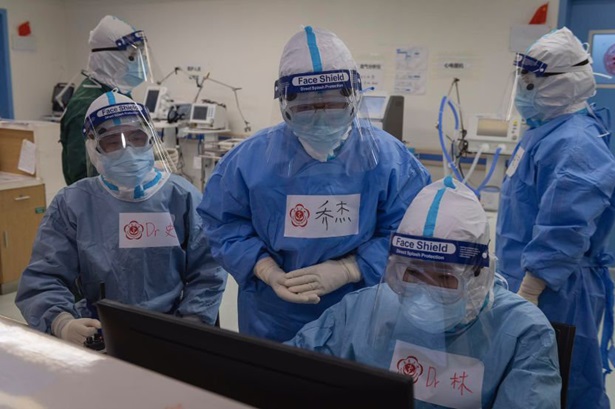
Qiao and her team coordinate treatment plans
In the beginning, hope and encouragement were mainly given by medical staff to the patients to support their recovery, but along the way, the patients were giving back to the medical staff the strength and words of encouragement needed for them to continue with the frontline battle.
Maternity care for expectant mothers with COVID-19
As an obstetrician, reproductive physician and biologist, Qiao’s research mainly focuses on the molecular mechanism of human gametogenesis and embryo development, infertility causes, and the development of clinical treatments.
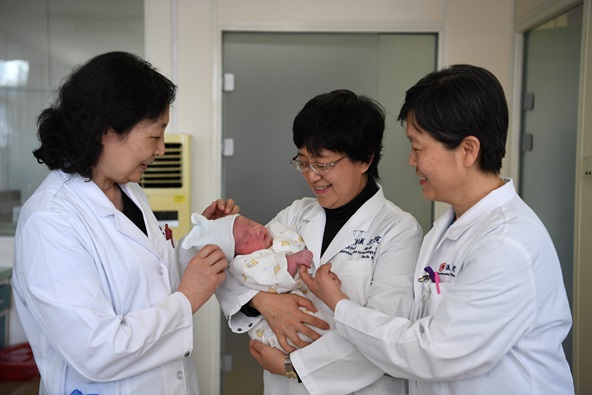
Qiao looks after a new born baby prior to the COVID-19 pandemic
During this pandemic, Qiao focused on maternal and child health services as well. Her team investigated the risk of mother to child vertical transmission at the first time, and timely published comments and clinical research results in international top journals. On April 18, 2020, Qiao and Zhao Yangyu’s team from PUTH successfully published a paper titled “Clinical Characteristics of Pregnant Women with COVID-19 in Wuhan, China” in The New England Journal of Medicine, which presented the team’s research results to the rest of the world. The research focused on analysing available data collected from pregnant women that contracted COVID-19 in Wuhan. Moreover, the suggestions she provided on diagnosis and treatment of pregnant women have added in the Guidelines on the Novel Coronavirus-Infected Pneumonia Diagnosis and Treatment (Provisional 7th Edition) in China, which had great significance to guide perinatal health care and formulate corresponding prevention and treatment measures.
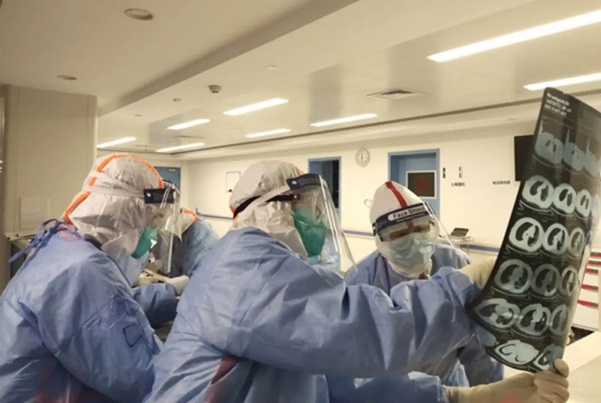
Qiao and her team analyze a CT scan
Answering queries from the public
Apart from publishing a paper, Qiao has also participated in many interviews from different media organizations to share her knowledge and experiences in fighting the virus with larger audiences worldwide, hoping that it would benefit the rest of the world. In her interviews, she shared her latest research results, responded to concerns revolving around maternity services during the pandemic, recounted her personal experiences and offered advice towards medical workers on the front line and ordinary citizens playing their part in combating COVID-19. Qiao particularly mentioned that although there is currently no reliable evidence to prove COVID-19 mother-baby transmission, it is especially important to take note of the health conditions of pregnant women as they are relatively more susceptible to respiratory infections, despite often only showing mild symptoms.

CCTV interviews Qiao
In her recent interview with CCTV, Qiao emphasized that attention should be paid to all health sectors, whether it be public health management, basic medical research, or pharmaceutical research. The arrival of COVID-19 has put us to the test, and made us rethink how we should extract big data, do analysis, and identify pathogens.
The return of our medical heroes
They left during winter and returned 72 days later during the spring season, greeted by beautiful weather and the smiling faces of people in Beijing eagerly waiting to celebrate their safe return. During the 72-day battle, Qiao's team worked tirelessly through day and night, patiently treating critically-ill patients and efficiently handling the surge in patient load during the earlier stages. They adopted multidisciplinary and precise measures, effectively improving the cure rate of critically ill patients and accelerating the treatment duration for the patients in Wuhan.
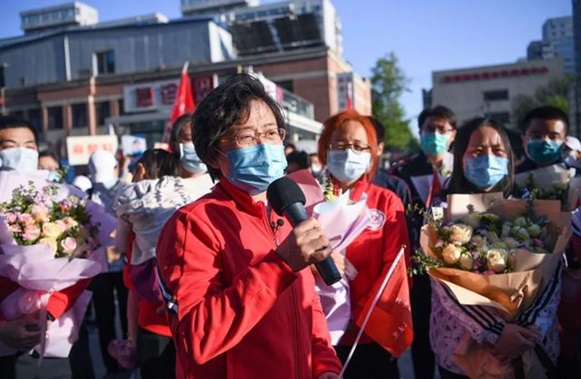
Qiao gives a speech on the day of her return
"We have succeeded!" Qiao excitedly announced the news of their victory. “We rose to the challenges and faced the test of moral characters,” she said.
Waiting eagerly among the crowds was Qiao’s husband, Mr. Liu. As they embraced each other with tears pouring out of their eyes, Liu told the reporters that he watched TV at home every day just to keep up with the latest information. Despite his worries, he has always believed in Qiao and the medical team’s capabilities.
Liu wasn’t the only one who was waiting anxiously for Qiao’s safe return home. Qiao is also the mother of a son. Since the young age, Qiao’s son has witnessed his mother spending almost all her waking hours at work. The day of Qiao’s return marked a very joyous reunion for their family.

Qiao and her husband
On the front line of the battlefield are many frontline workers like Qiao, who have worked for long hours, refusing to succumb to their exhaustion. They are professors, colleagues, friends, siblings, and even mothers and fathers of some. They are the “angels in white” who have devoted themselves fully to the fight against the coronavirus outbreak. As the COVID-19 pandemic is gradually brought under control in China, much of the rest of the world is still at the vital stage of the fight against the virus. All the healthcare workers are the frontline soldiers in this fight, exemplifying selflessness, determination, and bravery despite having to face long and arduous working shifts. Millions are separated from their loved ones to ensure that their family and community are safe while they take a personal risk for themselves in caring for those who are ill. As medical workers across the globe continue to combat the contagion under extreme conditions, we will stand behind them and show them our endless gratitude and support!
Written by: June Tan Rui Min
Edited by: Zhang Jiang, Huang Weijian, Sam Jones
Photo credit to: Peking University News Center, Peking University Third Hospital, China Daily, CCTV, Women of China









